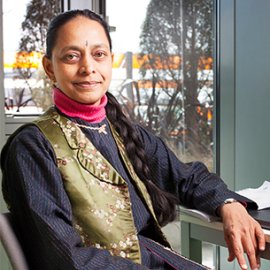History, Independent Social scientist and journalist, India

Octobre 2017 à Avril 2018
Umamaheshwari R. has a doctorate in History from Jawaharlal Nehru University for her work on the Tamil Jaina community history. For a large part, she has been an independent journalist and historian. She has also had short stints teaching in colleges and institutions at different times. She was born in Mumbai, Maharashtra (the youngest of three siblings), and brought up mostly in Delhi and Hyderabad. Her first book, When Godavari Comes: People’s History of a River - Journeys in the Zone of the Dispossessed (Aakar Books, 2014), was based on her seven-year engagement with the issue of displacement of communities to a major dam (Polavaram, in Andhra Pradesh) under construction on the river Godavari. She has two more books forthcoming, both pertaining to her research on Tamil Jainism. She was a Fellow at the Indian Institute of Advanced Study, Shimla, and also the recipient of several media and academic fellowships/scholarships in India and one in the UK. She has also lived and worked in the hills of Kumaun, Uttarakhand state, besides having conducted research on diverse subjects such as skewed developmental policies pertaining to tribal communities, assessing community perspectives on coral reefs, internally displaced communities, etc., in different Indian states, at different times.
For a Theory on Ecological and Cultural Imaginary: River, nature, community histories and the politics of marginalisation
The geographical-cultural backdrops of this research are the Indian states of Telangana, Andhra Pradesh, Tamil Nadu in the south and Himachal Pradesh and Kumaun-Garhwal in the north. The project considers cultural and ecological imaginary as social and political constructs, informing ideas of nature, history and memory. This is done through engagement with different contexts, given below.
Ecological imaginary - For the Kondareddi, Koya and other tribal communities living by the river Godavari (in Andhra Pradesh, Telangana and bordering Chhattisgarh), the Tamarind, Mango, Ippa (Basia latifolia) trees inhere sacredness and festivals are dedicated to their worship annually. The forests are also home to small patches of podu (shifting cultivation) that supplement income and food. The agrarian, for them, is also the forest. With the Madras Forest Act of 1883, and subsequent state intervention, even post-Independence, in the Godavari districts, Wildlife Sanctuary, National Park, etc. gave a different — ‘governancing’— meaning to these spaces. For the fishing communities on the river Godavari, its flows are intrinsic to their own histories and identities. Fishing zones are culturally and inter-generationally fixed. With colonial and post-colonial state intervention, rivers are seen as a commodity and of utilitarian value alone; hence ‘flow’ and ‘fluid’ notions of spaces are not acknowledged.
Cultural Imaginary - Certain communities persevere with their acts of remembrance and memory as intrinsic to their community identity. The identity of several minoritised or marginalised communities (in terms of caste groups or indigenous/tribal/adivasi/officially designated minorities) seems to be bound inseparably to ‘not forgetting’ (not simply remembering) or ‘remembering not to forget’ what they have been through in the past, what they are going through at present and here the dominant, hegemonic should be seen as the one that constructs over time these marginal identities. In this context is located one example, of the Tamil Jaina community of Tamil Nadu.
R, Umamaheshwari. When Godavari Comes: People’s History of a River, Aakar Books, New Delhi, 2014
R, Umamaheshwari. ‘Dislocations, Marginalisations, Past and Present: Pain-Experiences of Two Marginalized Communities’, in George, k. Siby, P.G. Jung, Eds, Cultural Ontology of the Self in Pain, Springer, New Delhi, Heidelbeg, New York, 2016, pp. 227-247
R, Umamaheshwari , ‘Reconfiguring ideas of land, river and forest in the context of the Indira Sagar Polavaram National Project on Godavari’, in Bhagat-Ganguly Varsha, Ed., Land Rights in India, Routledge, South Asia edition, New Delhi, 2016, pp. 31-48
R, Umamaheshwari, ‘River as a Feminine Presence: Godavari in Andhra Pradesh’, in Iyer, R, Ramaswamy, Living Rivers, Dying Rivers, Oxford University Press, New Delhi, 2015, pp. 219-239
R, Umamaheshwari, ‘From Non-Being to Being and Becoming: Nilakeci’, IIC Quarterly, Autumn 2012, India International Centre, New Delhi, 2012, pp.1-10
R, Umamaheshwari, ‘Constructing the Marginalised: Some Reflections on the Tamil Jainas in History’, Journal of History, Vol.28 (2010-11), Department of History, Jadavpur University, Kolkata, 2011, pp. 7-33